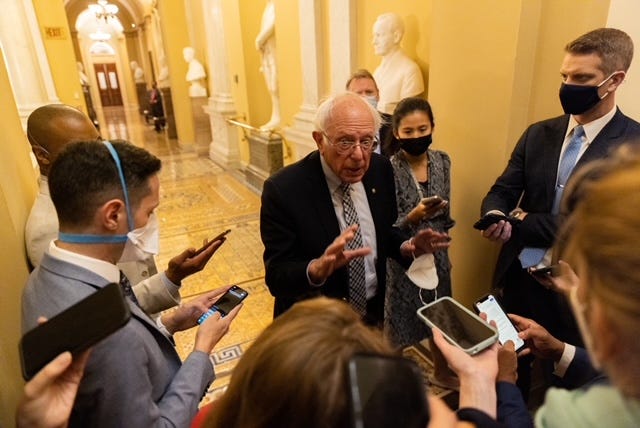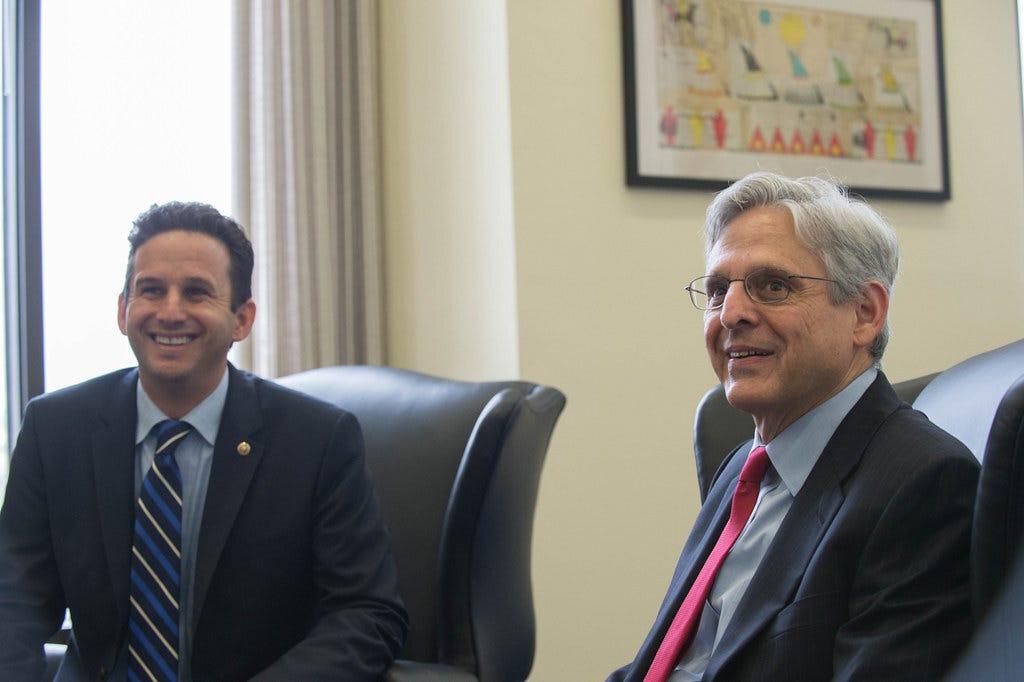Wake Up To Politics - October 12, 2021
Wake Up To Politics: Warning signs flare for Democrats
Good morning! It’s Tuesday, October 12, 2021. Election Day 2024 is 1,120 days away. Election Day 2022 is 392 days away.
Trend to watch: Warning signs flare for Democrats
With just more than a year to go until the 2022 midterms, Democrats are increasingly panicked about their chances of maintaining their control of both chambers of Congress. Here are the main warning signs that have Democrats so worried:
1. Party divisions. Democratic leaders are scrambling to pass both the bipartisan infrastructure package and their one-party spending package by October 31, yet another deadline that seems like it could come and go without any progress on the two pieces of legislation.
Although many Democrats are convinced they will be doomed in 2022 if they don’t pass both of their major priorities, the bills have been stalled amid an internal split over the size of the one-party spending package. Centrist Sen. Joe Manchin (D-WV) has yet to budge from his proposed price tag of $1.5 trillion, while Congressional Progressive Caucus Chair Pramila Jayapal (D-WA) is pushing President Joe Biden to keep the package around $3 trillion.
It seems inevitable that the original $3.5 trillion package will have to be shrunk in some way, but Democrats have yet to coalesce around a plan to trim their sweeping proposal. According to Politico, Biden is considering an approach that would keep the programs from the original proposal but merely authorize them for less time with less funding. House Speaker Nancy Pelosi, on the other hand, has seemingly embraced a different plan: fully funding some of the package’s topline programs and then slashing the rest.
The divide over how to move forward on the reconciliation bill has led to intraparty tensions spilling out in the open, never a good thing for a political party ahead of an election year. Progressive Sen. Bernie Sanders (I-VT) blasted Manchin in a press conference last week; Manchin also feuded in recent days with Senate Majority Leader Chuck Schumer (D-NY). Not exactly a recipe for party unity, which Democrats will need if they are going to approve trillions of dollars in spending in the coming weeks.

2. Biden’s approval rating. There are no rock-solid indicators for midterm success, but a fairly reliable one is the sitting president’s approval rating. When the president’s approval rating is under 50%, his party tends to suffer during the midterms; in both of the two cycles in the past 30 years in which a president’s party has gained seats in the midterms, the president had above-water approvals.
That is the source of a lot of stress among Democrats, who have watched with dismay as Biden’s approval rating has slipped from around 55% upon taking office to around 43% now, according to the RealClearPolitics average.
In one Quinnipiac poll released last week, Biden’s approval rating was recorded as low as 38%; among independents, his approval rating sank to 32% while his disapproval rating swelled to 60%. There are myriad reasons experts have cited for Biden’s slipping numbers, from the staying power of the coronavirus pandemic to the chaotic Afghanistan withdrawal; no matter the cause, if the president is unable to engineer an approval ratings comeback, the Democratic path to hanging on to control of Congress is regarded as narrow at best.

But that’s not all. Here are a few more trends giving Democrats pause:
Democrats created monthly Child Tax Credit payments earlier this year, a popular program that viewed as key to their midterms success. But polling shows that few voters are aware of or crediting Democrats for the payments, which is worrying party leaders as they prepare to pass even more social spending measures. (Politico)
Handling of the economy is of the areas where Biden is seeing dropping poll numbers. The president received even more disappointing news in this regard on Friday, when the Labor Department reported that the U.S. added 194,000 jobs in September — much lower than the projected 500,000, suggesting that the pandemic’s throttling of the economy continues. (CNBC)
Former President Donald Trump seems to be gearing up for another White House bid in 2024. While some Democrats view a Trump comeback as a gift for energizing their party, others are fearful of Republicans once again having their biggest turnout machine at the top of the ticket. (The Hill)
The Virginia gubernatorial election will be held in less than a month, and polls show the race is tightening. If the race really does end up close in the Democratic-leaning state, some party strategists view it as a harbinger of more doom to come in the following year. (Washington Post)
Democrats are also struggling with voter registrations in pivotal states (NBC News) and trailing in the midterm generic ballot question (Quinnipiac).
Finally, one Democratic data whiz has created a model with some bad news for Democratic hopes of keeping the Senate in 2022 and 2024, a projection that caused a lot of buzz on social media this weekend. (New York Times Opinion)
Policy Roundup: Education
By Wake Up To Politics education contributor Kirsten Shaw Mettler.
The Justice Department is calling on federal law enforcement to investigate educator harassment. As battles continue to wage in schools across the country on issues like masking and critical race theory, educators say that they have been facing increased levels of mistreatment. Attorney General Merrick Garland called the recent trend a “disturbing spike in harassment, intimidation, and threats of violence.”
Last week, the National School Boards Association contacted the White House directly, claiming that school board meetings across the country are experiencing increased rates of threats and disruptions. These harassment concerns arise as schools are already struggling with teacher and staff shortages.
Changes to the Public Service Loan Forgiveness Program were announced on Wednesday. The program is intended to support those interested in public service careers to afford college education, but it has long been viewed as a sort of mirage, with 98% of those who apply for the relief being rejected. The new changes work to make more loan forgiveness available to those who work in public service, but the Education Department acknowledges that these current fixes are temporary; they plan to roll out more permanent adjustments by Fall 2022.

More education news to know, via Kirsten:
Sexual assault survivors and advocates protested in Washington over a perceived lack of action on making changes to Title IX issues.
New York City Mayor Bill De Blasio announced plans to replace the city’s “Gifted and Talented” program in light of segregation concerns.
California became the first state to include ethnic studies in its high school graduation requirements.
Two parents from the Varsity Blues college admissions scandal have been convicted.
Daybook
All times Eastern.
WHITE HOUSE
President Joe Biden will meet virtually with G20 leaders at 8:45 a.m. to discuss “close coordination on Afghanistan among the world’s largest economics, select guests, and international financial institutions.” The G20 is made up of the world’s 19 largest economies, plus the European Union.
At 10:15 a.m., Biden will receive his daily intelligence briefing.
Vice President Kamala Harris will join Biden for his intelligence briefing. Then, at 11:35 a.m., she will deliver remarks at the 78th annual convention of the National Congress of American Indians. At 3:45 p.m., she will meet with Israeli Foreign Affairs Minister Yair Lapid.
First Lady Jill Biden will travel to Kansas and Illinois for events marking National Hispanic Heritage Month. At 2:30 p.m., she will host an event at El Centro Academy in Kansas City with Small Business Administrator Isabella Casillas Guzman and Rep. Sharice Davids (D-KS). At 6 p.m., she will visit the National Museum of Mexican Art in Chicago with Rep. Chuy Garcia (D-IL).
White House Press Secretary Jen Psaki will hold her daily press briefing at 2 p.m.
CONGRESS
The Senate is on recess until Monday, October 18. The chamber will meet briefly at 12 p.m. for a pro forma session; no business will be conducted.
The House will convene at 3 p.m. The chamber will hear 15 one-minute speeches from each party, before recessing until around 4 p.m. The House will then return to vote on a measure that will trigger passage of the Senate-passed bill to increase the debt ceiling by $480 billion.
The vote will technically be on a “self-executing rule”; upon passage of the rule, the debt ceiling bill will be “deemed” to have been passed. The rule will also set up debate later in the week for three pieces of legislation: H.R. 3110, the PUMP for Nursing Mothers Act; H.R. 3992, the POJA Act of 2021; and H.R. 2119, the Family Violence Prevention and Services Improvement Act of 2021.
Finally, the House may also vote under “suspension of the rules” on passage of three additional pieces of legislation:
H.R. 1029, the Free Veterans from Fees Act
H.R. 4611, the DHS Software Supply Chain Risk Management Act of 2021
H.R. 4089, the Darren Drake Act
COURTS
The Supreme Court will release orders at 9:30 a.m., before convening later in the day for oral arguments.
At 10 a.m., the court will hear arguments in Cameron v. EMW Women's Surgical Center.
From WUTP legal contributor Anna Salvatore: In 2018, Kentucky passed a law banning an abortion technique called dilation and evacuation. While the law was being challenged in 2019, the state’s Democratic health secretary declined to defend it in federal court. In this case, the Supreme Court will explore whether the state’s Republican attorney general can intervene in the case.
At 11 a.m., the court will hear arguments in Thompson v. Clark.
From Anna: If you want to challenge your conviction or prison sentence under federal civil rights law, you must show that your criminal proceedings were terminated favorably. According to SCOTUSblog, this means that your sentence “was reversed on appeal, or [you] received federal post-conviction relief that points to [your] innocence.” Today the justices will consider whether the proceedings must explicitly indicate your innocence before you can sue.
ELECTIONS
New Jersey Gov. Phil Murphy and Republican gubernatorial nominee Jack Ciattarelli will face off in their second debate at 8 p.m. It will be their last debate before the November 2 election.
Thanks for waking up to politics! If you enjoy reading this newsletter, I’d be so grateful if you’d consider donating to help support me and my work. If you want to show off your support for Wake Up To Politics, you can also buy some merchandise.
Also: don’t forget to tell your friends and family to sign up for the newsletter at wakeuptopolitics.com. And if you have any questions or comments, feel free to email me at any time.




